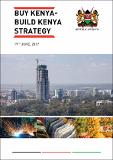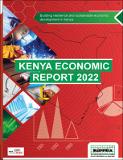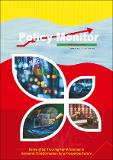Kenya Economic Report 2021 on Kenya in the Covid-19 Era: Fast-Tracking Recovery and Delivery of the "Big Four" Agenda
Publication Date
2021Author
Type
KIPPRA Publicationsviews
downloads
Metadata
Show full item recordBy
The Kenya Institute for Public Policy Research and Analysis (KIPPRA)
Abstract/
The Kenya Economic Report (KER) 2021 is the thirteenth in a series of annual reports prepared by the Kenya Institute for Public Policy Research and Analysis (KIPPRA), pursuant to the KIPPRA Act No. 15 of 2006. The theme for the KER 2021 is “Kenya in COVID-19 Era: Fast-Tracking Recovery and Delivery of the Big Four Agenda”. The overall goal is to provide the basis for turning around the economy, which has been negatively affected by the Coronavirus Disease (COVID-19) pandemic since the beginning of the year 2020, and thus support delivery of the “Big Four” agenda. The “Big Four” agenda, anchored in the third Medium-Term Plan (MTP) of the Kenya Vision 2030, outlines four priority areas to fast-track growth and improve the standards of living of citizens by ensuring food security, expanding the manufacturing sector to create jobs, providing universal health coverage, and providing affordable housing accessible to the low-income earners. Before the COVID-19 pandemic, the economy was robust, expanding by an average of over 5.0 per cent. The pandemic has plunged the economy into a recession, with a very sharp contraction experienced for the first time in the last two decades. The pandemic is much more than a health crisis as it has disrupted the social and economic activities as well. As a result, the economy contracted by 0.3 per cent in 2020. In the medium term, the economy faces other downside risks including the invasion by desert locusts, weather-related risks, and political tensions as the country approaches the 2022 general elections. The rebound of the economy is therefore expected to be driven by recovery in key sectors that were significantly affected by COVID-19; exploiting opportunities such as the African Continental Free Trade Agreement (AfCFTA) in growing trade; sustaining Government investments in infrastructure; and sustaining prudent economic management
Subject/
Economic Development; Sustainable Development; Covid-19 Pandemic; Economic Recovery Sreategy; Food Security; Poverty Reduction
Publisher
The Kenya Institute for Public Policy Research and Analysis (KIPPRA)Series
KER;2021Collections
Related items
Showing items related by title, author, creator and subject.
-
Buy Kenya-Build Kenya Strategy 2017
Republic of Kenya (Republic of Kenya, 2017)Kenya has pursued export oriented economy which has seen the introduction of diverse export incentives and regimes. The export incentives have led to rise in manufacturing for exports especially in the targeted sectors. ... -
Kenya Economic Report 2022 on Building Resilience and Sustainable Economic Development in Kenya
The Kenya Institute for Public Policy Research and Analysis (KIPPRA) (The Kenya Institute for Public Policy Research and Analysis (KIPPRA), 2022)Kenya’s economy rebounded strongly in 2021 amid the COVID-19 pandemic disruptions, high global fuel prices and low precipitation experienced in the country during the year. The economy grew by 7.5 per cent in 2021 ... -
Policy Monitor Issue 16 No. 02 October-December 2023 on Kenya @60: Tracking Key Milestones in Economic Transformation for a Prosperous Future
The Kenya Institute for Public Policy research and Analysis (KIPPRA) (The Kenya Institute for Public Policy Research and Analysis (KIPPRA), 2023)This edition comes at a time when Kenya is marking its diamond jubilee celebrations on 12th December. As such, this edition is themed “Kenya @60 and Industrialization Prospects under BETA”. The main articles in this ...




